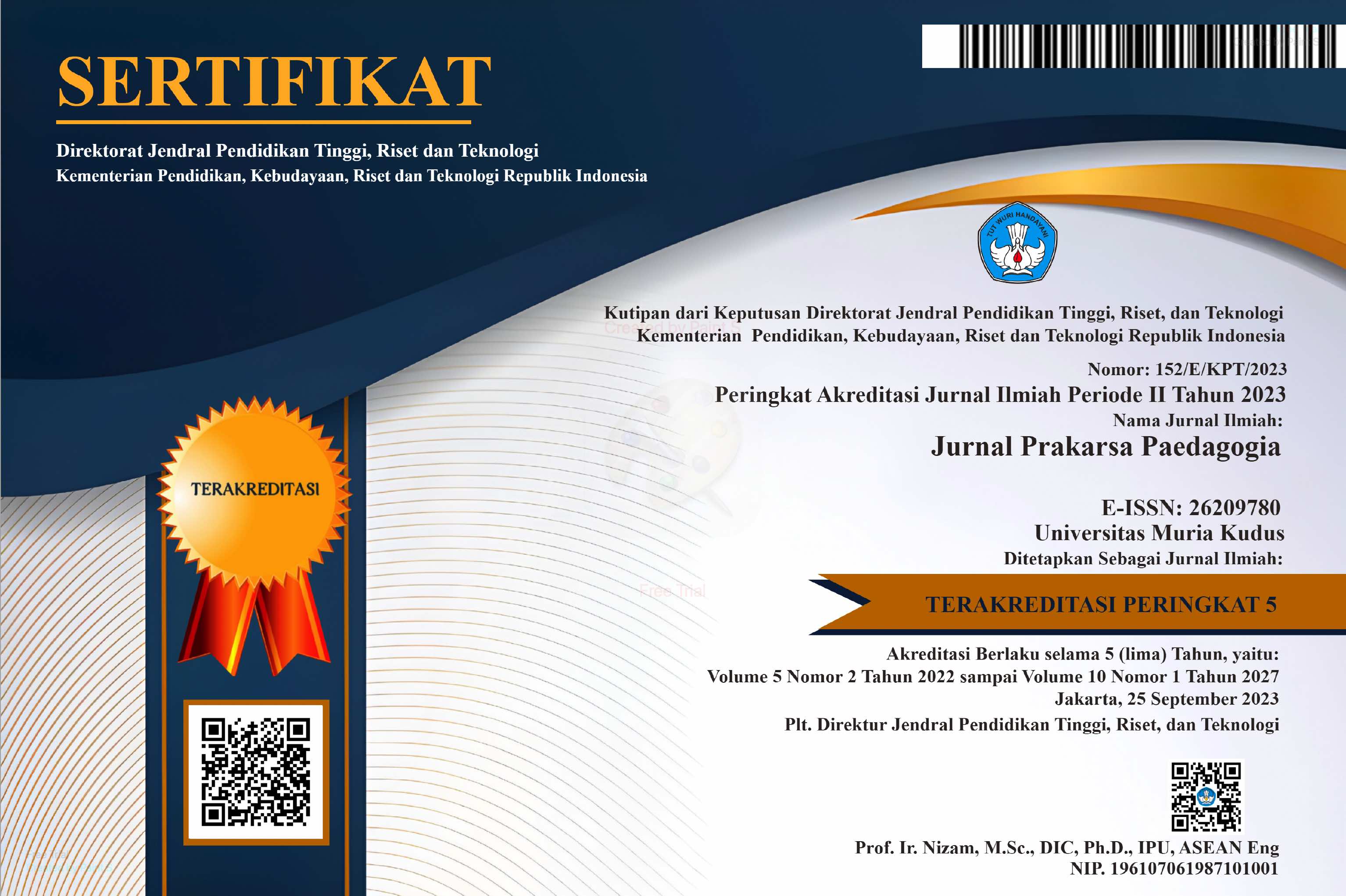Pendidikan Kolaboratif Berbasis Ekologi Lingkungan (Studi Sumber Mata Air Wonosoco)
Abstract
Keywords
Full Text:
125-133 (Bahasa Indonesia)References
Alkire, D., Levitas, D., Warnell, K. R., & Redcay, E. (2018). Social interaction recruits mentalizing and reward systems in middle childhood. Human Brain Mapping, 39(10), 3928–3942. https://doi.org/10.1002/hbm.24221 Aysun, B., & Sona, M. (2017). the Effects of Social Media Use on Collaborative Learning : a Case of Turkey. Turkish Online Journal of Distance Education, 18(1), 96–110. Barni, D., Russo, C., Zagrean, I., Di Fabio, M., & Danioni, F. (2020). Adolescents’ internalization of moral values: the role of paternal and maternal promotion of volitional functioning. Journal of Family Studies, 0(0), 1–13. https://doi.org/10.1080/13229400.2020.1789494 Brahimi, T., & Sarirete, A. (2015). Learning outside the classroom through MOOCs. Computers in Human Behavior, 51, 604–609. https://doi.org/10.1016/j.chb.2015.03.013 Corris, A. (2020). Defining the Environment in Organism–Environment Systems. Frontiers in Psychology, 11(July), 1–13. https://doi.org/10.3389/fpsyg.2020.01285 Cresswell, J. W. (2014). Research design: Qualitative, Quantitative and Mixed Methods Approaches (4th ed.). Sage Publications, Inc. Eiamkanchanalai, S., Assarut, N., & Surasiengsunk, S. (2019). Attitude toward the elderly and social interaction: Approach toward an intergenerational society. Kasetsart Journal of Social Sciences, 40(3), 609–618. https://doi.org/10.1016/j.kjss.2017.12.010 Fajrie, N. (2013). Media Pertunjukan Wayang untuk Menumbuhkan karakter Anak Bangsa. Publikasi Ilmiah UMS, 218–233. Karmakar, R. (2015). Does Parenting Style Influence the Internalization of Moral Values in Children and Adolescents? Psychological Studies, 60(4), 438–446. https://doi.org/10.1007/s12646-015-0338-2 Kingsbury, L., & Hong, W. (2020). A Multi-Brain Framework for Social Interaction. Trends in Neurosciences, 43(9), 651–666. https://doi.org/10.1016/j.tins.2020.06.008 Knox, J. H. (2019). The global pact for the environment: At the crossroads of human rights and the environment. Review of European, Comparative and International Environmental Law, 28(1), 40-47. https://doi.org/10.1111/reel.12287 Maitland, C., Granich, J., Braham, R., Thornton, A., Teal, R., Stratton, G., & Rosenberg, M. (2018). Measuring the capacity of active video games for social interaction: The Social Interaction Potential Assessment tool. Computers in Human Behavior, 87, 308–316. https://doi.org/10.1016/j.chb.2018.05.036 McDonnell, J. (2018). Mind and the Environment. Axiomathes, 28(5), 521–538. https://doi.org/10.1007/s10516-018-9385-3 Mercuur, R., Dignum, V., & Jonker, C. M. (2019). The value of values and norms in social simulation. Jasss, 22(1). https://doi.org/10.18564/jasss.3929 Olsson, T., Jarusriboonchai, P., Woźniak, P., Paasovaara, S., Väänänen, K., & Lucero, A. (2020). Technologies for Enhancing Collocated Social Interaction: Review of Design Solutions and Approaches. Computer Supported Cooperative Work: CSCW: An International Journal, 29(1–2), 29–83. https://doi.org/10.1007/s10606-019-09345-0 Phillips, N. K. (2017). Children in the Urban Environment. Linking Social Policy and Clinical Practice (third). Charles C. Thomas, Publisher. Purbasari, I., & Fajrie, N. (2019). Pendampingan Pengtembangan Bahan Ajar Sejarah Makanan Tradisional Kudus. 1(1), 33–41. https://doi.org/https://doi.org/10.24176/mjlm.v1i1.3113 Rosa, L. R., & Menezes, A. B. (2019). Educational inclusion and social interaction: A literature review. Trends in Psychology, 27(2), 385–400. https://doi.org/10.9788/TP2019.2-07 Sugiyono. (2015). Educational Researh Methodology With Qualitative. Alfabeta. Yin, X., Wang, H., Xia, Q., & Gu, Q. (2019). How social interaction affects purchase intention in social commerce: A cultural perspective. Sustainability (Switzerland), 11(8). https://doi.org/10.3390/su11082423
DOI: https://doi.org/10.24176/jpp.v3i1.9667
Refbacks
- There are currently no refbacks.
Copyright (c) 2023 Jurnal Prakarsa Paedagogia

This work is licensed under a Creative Commons Attribution-NonCommercial-ShareAlike 4.0 International License.
Visitors of the Paedagogia Prakarsa Journal Status
Country of Origin of Visitors:
Jurnal Prakarsa Paedagogia dari Fakultas Keguruan dan Ilmu Pendidikan Universitas Muria Kudus is licensed under a Creative Commons Attribution 4.0 International License.
Dedicated to:







